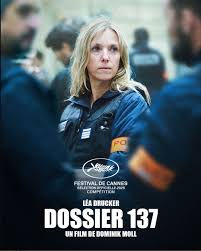Partir un Jour
- Paolo Alessi
- 24 mag 2025
- Tempo di lettura: 2 min
Aggiornamento: 5 giu 2025

“Partir un jour – Leave for a Day”, the opening film of the 2025 Cannes Film Festival directed by Amélie Bonnin, mirrors the spirit of the festival itself, a passage between worlds, identities, and emotional landscapes.
It is not just a physical journey but, above all, an inner and personal one. The protagonist, Cécile (played by Juliette Armanet), is a young French chef on the rise who is forced to confront her past as she revisits the places of her youth in her hometown. This return sets a deep process of reflection on her life, her family ties, and the choices she has made over the years.
Following her father's heart attack, Cécile decides to return to her small native village to be by his side, temporarily helping to manage the family restaurant. However, her life in Paris is far from on hold: she’s about to open a new restaurant with her partner Sofiane, following her victory in a major televised cooking competition.
What initially seems like a short tour soon turns into a moment of profound revelation. Cécile finds herself immersed in a world that deeply belongs to her, but which she had left behind in pursuit of emancipation and success. Unresolved tensions come to the surface: the strained relationship with her parents, the conflict between professional ambition and emotional bonds, an unwanted pregnancy, and the return of her ex-boyfriend Raphaël, a figure linked to powerful memories.
Although the film includes some light elements typical of French comedies, playful moments, agile dialogue, and musical touches, Partir un jour stands out for the intensity of the themes it explores: female emancipation, the struggles of leaving one's roots, and the search for identity. The inserted songs don’t disrupt the narrative rhythm; instead, they gently accompany it with grace and introspection. This is not a traditional musical, but rather a use of music as an emotional extension soft, almost whispered. Visually, the film adopts a restrained style: warm tones, static shots, rural and familiar settings. There are no stylistic excesses, just a discreet direction that allows the characters to shine. Also noteworthy is how the culinary world is portrayed: there's no fetishization of gourmet dishes. Instead, cooking is shown as a part of everyday life, being stressful, chaotic, and full of memories.
Ultimately, the film's central theme is the journey, understood as a necessary return in order to truly move forward. The “leaving” in the title is not merely an escape, but also a conscious choice, a need to redefine oneself. Cécile’s path—painful, uncertain, but deeply authentic—reminds us that sometimes we must lose ourselves to find ourselves, and that roots, when truly embraced, can be a starting point rather than an end.
by Paolo Alessi




Commenti